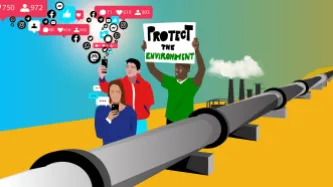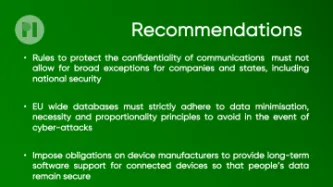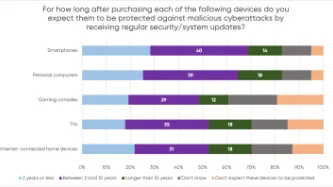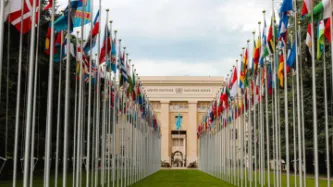Search
Content type: Report
… Network of Civil Liberties Organizations (INCLO), and Privacy International (PI) joined together to track the … or legal basis, which is disproportionate to the stated objective, creating a serious threat of data abuses, … and contributes to the normalization of a surveillance state that accumulates large amounts of data about people in …
Content type: Explainer
… the varied uses of SMS, and the challenges arising from it: privacy, security and reliability-wise. Explainer Post date … is no way one can prove that a message is coming from its stated source; and, as discussed above, message delivery is … alert system mentioned above for example, it is clearly stated that "you must have a modern smartphone for it to be …
Content type: Long Read
… Key findings Environmental activists unanimously stated in survey responses that tech was essential to their … of their devices and online activities. All respondents stated that tech was essential to their activism , with 93% … sometimes even unknowingly and if you do not amend your privacy settings in a certain way, your data is more …
Content type: Long Read
… 2022 By shalamov Last update: 26 April 2023 In 2022, Privacy International continues to produce real change by … will be extracted from a device. Further, the code states that other less intrusive means of obtaining … cybercrime regulations set up internationally The UN member-states started negotiations for a new cybercrime treaty – a …
Content type: Advocacy
… from the use of AI in the migration context . Whilst states and institutions often promote AI in terms of … the Council of the European Union, and EU Member States to ensure the EU Artificial Intelligence Act protects … Migrants (PICUM), International Politiscope, Croatia Privacy International, International Privacy Network, Italy …
Content type: Long Read
… After a consultation held in 2021 to which Privacy International responded, the government has now … protect individuals and their privacy." The government also stated that it "[understood] the concerns expressed by … and data-collection powers. Terminology matters As stated above, all too often public sector fraud is conflated …
Content type: News & Analysis
… migrants' mobile phones breached their fundamental right to privacy, UK courts breathe some life into the human rights … Humanitarian Law as adopted by the UN General Assembly: "States shall [...] [make] available adequate, effective, … affected by unlawful government policies, and of States' obligation to endeavour to provide them all with …
Content type: Long Read
… . The autonomy given by the Indian Constitution to the 28 states and 8 union territories means that the right to … at the national level by various autonomous agencies and states can implement them in the way that best suits their … this repository of student's face data still doesn't have a privacy policy and is hosted on DigiLocker who's privacy …
Content type: Examples
… Examples Date 20th October 2022 Location United States of America Ohio teenager Aaron Ogletree has won a lawsuit he filed against Cleveland State University after he was required to pan a webcam … Teen Vogue See more examples EdTech: Surveillance Tracker Privacy invasion Our campaign EdTech needs Schooling …
Content type: Examples
… Examples Date 12th October 2010 Location United States of America In a 2010 case, the Lower Merion school … Wired See more examples EdTech: Surveillance Tracker Privacy invasion Surveillance …
Content type: Examples
… Examples Date 3rd August 2022 Location United States of America Even though schools are back in session in … https://www.wired.com/story/student-monitoring-software-privacy-in-schools/ Writer: Pia Ceres Publication: Wired … LGBTIQ+ Discrimination EdTech: Surveillance Tracker AI Privacy invasion Communications Surveillance Learn more …
Content type: Advocacy
… Key points In this hearing which focused on 'Spyware and ePrivacy', our intervention first discussed whether current … ePrivacy directive can apply to the use of spyware by state authorities, including how states often use 'national security' to exclude surveillance …
Content type: Report
… of the device are resolved to reduce risks to consumers’ privacy and security. In addition to the YouGov survey, in … a YouGov survey across consumers from five EU member states (Italy, Poland, Germany, Spain and France). The … age. Notes to editors: All figures, unless otherwise stated, are from YouGov Plc. Total sample size was 6331 …
Content type: Press release
… of the device are resolved to reduce risks to consumers’ privacy. At the moment, EU laws require that smart devices … Poland, France and Italy. All figures, unless otherwise stated, are from YouGov Plc. Fieldwork was undertaken … on their lifespan. For more information contact press@privacyinternational.org. Learn more Cyber Security Internet …
Content type: Press release
… on 5 October 2022, come in response to complaints filed by Privacy International, Access Now, Sea-Watch, BVMN, Homo … Union has been supporting surveillance in non-member states without the proper accountability or transparency … to be inadequate, undermining their universal nature, this statement is misleiding. Human rights is first about rights …
Content type: Advocacy
… to general principles relating to the fundamental right to privacy, including privacy by design and by default, … Work Directive (PWD) became law in October 2024. Member States have until December 2026 to implement its provisions … workers, such as data on their emotional or psychological state and personal beliefs. Nor can they collect data while …
Content type: Report
… encryption (E2EE) contributes significantly to security and privacy. For that reason, PI has long been in favour of the … to recreate, in the digital world, the guarantees of privacy that have traditionally applied in private … but rarely secures the metadata of communications. Some states also place restrictions, including criminal …
Content type: Advocacy
… academics, and civil society organisations - including Privacy International - have written to the World Bank's … Signatories Privacy International Digital Welfare State and Human Rights Project, Center for Human Rights and … Rights Forum Taiwan Association for Human Rights (TAHR) Statewatch Resurj Data4Revolution Phil Booth, Coordinator, …
Content type: Advocacy
… académicos y organizaciones de la sociedad civil -incluida Privacy International- han escrito a la iniciativa ID4D del … Firmantes Privacy International Digital Welfare State and Human Rights Project, Center for Human Rights and … Forum Asociación de Taiwán para los Derechos Humanos (TAHR) Statewatch Resurj Data4Revolution Phil Booth, Coordinador, …
Content type: Long Read
… Privacy International ("PI") researched a number of social … reason or another, do not have a registered identity in the state they live in. Our aim is to analyse how these social … to "social infrastructure" projects. The World Bank's stated aim is to help countries achieve "sustainable and …
Content type: News & Analysis
… by Holly Mina Jones https://www.hollyminajones.com/ Privacy International (PI) has today filed complaints with … laws and violates individuals’ Article 8 right to privacy in a number of ways, and calls on the ICO to open an … 100m of more. Camilla Graham Wood, Research Director at PI, states "It is unacceptable that as a result of quality …
Content type: Advocacy
… use of GPS tags for those subject to immigration control, Privacy International has brought a complaint to the … companies for these purposes. According to the Secretary of State's Immigration Bail Guidance , trail data can be used: … relation to Capita Electronic Monitoring Service, the ICIBI states that: ‘Inspectors requested data held on technical …
Content type: News & Analysis
… The right to privacy encompasses bodily autonomy and the right to access … care. In light of the recent decision of the United States’ Supreme Court in Dobbs v Jackson Women’s Health , we … between privacy and access to abortion care In 1973, in the state of Texas, it was a criminal offence to “procure or …
Content type: Long Read
… an overview of our research findings on the intersection of privacy and sexual and reproductive health. Key findings … of the recent restrictions to abortion rights in the United States, it is likely that data disclosing abortion care will … With the criminalisation of abortion care across US states, we are likely to see these tactics being deployed on …
Content type: Long Read
… Privacy International has been researching how emergency … in the Sub-Saharan Africa region . According to official statements this solution relies on methods such as satellite … was made public but still an independent observer stated that only 61% of beneficiaries knew why they had been …
Content type: Long Read
… session , and some of these concerns were confirmed by statements made by various States and civil society organizations (CSOs) during the … of the term seems to be too broad. In our interventions ( Privacy International , H uman R ights Watch , Electronic …
Content type: Advocacy
… understanding after long campaigns by organisations like Privacy International. We are concerned about the lack of … and impact on the advertising ecosystem cannot be overstated - the vast majority of the harms caused by online … feel[ing] they are being “stalked” around the internet” as stated in the introduction of this proposal. What is to be …
Content type: Advocacy
… Post date 24th June 2022 Photo by Darko M. on Unsplash Privacy International (PI) welcomes the call of the Special … (including those temporary measures as part of a state of emergency), with the view to control, reduce or … UN Special Rapporteur to investigate further. Attachments Privacy International - Submission to the UNSR on the rights …
Content type: Advocacy
… High Commissioner for Hu man Rights (HCHR) on the right to privacy in the digital age. Key points In our submission we … of journalists and human rights defenders Access of state authorities to personal data collected by companies, … contexts Use of publicly accessible information and data by state authorities, for example when monitoring social media …
Content type: Long Read
… Privacy International and UCL student exposes how … users”. Source: https://privacy.microsoft.com/en-us/privacystatement) On the employees' side, there is little left to … data at the organisation level. Microsoft clearly states in their Privacy Statement that they are not …
























